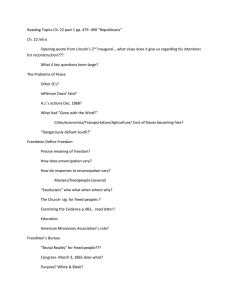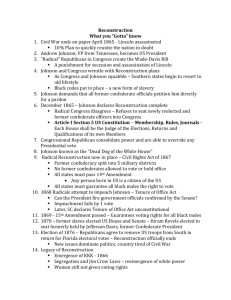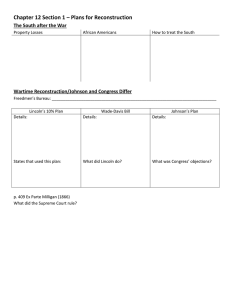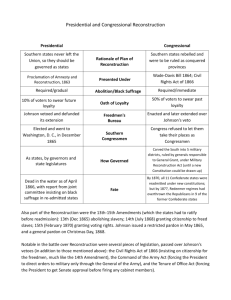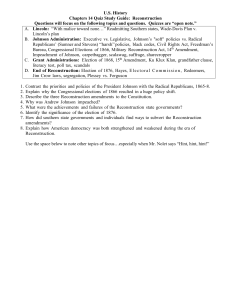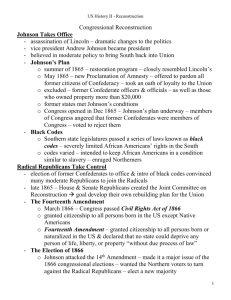TheReconstructionEraPPT2
advertisement
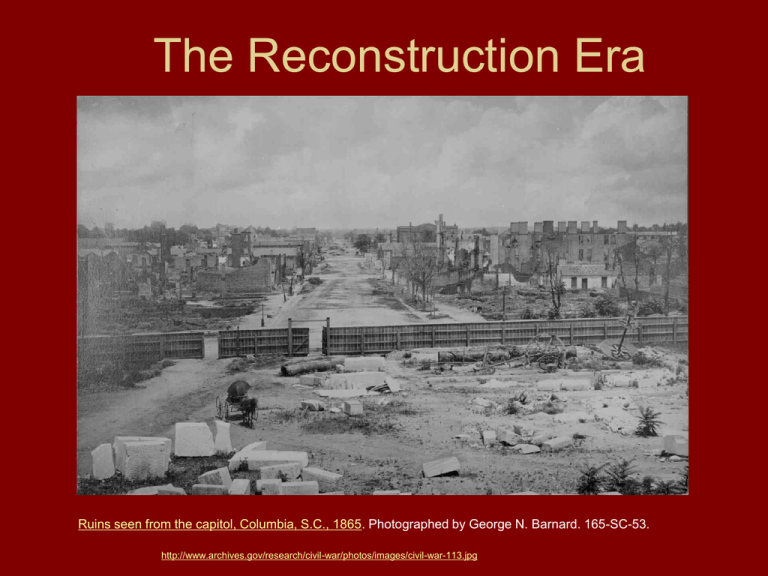
The Reconstruction Era Ruins seen from the capitol, Columbia, S.C., 1865. Photographed by George N. Barnard. 165-SC-53. http://www.archives.gov/research/civil-war/photos/images/civil-war-113.jpg After the War • South lay in ruins (destroyed) • Nearly 4 million freedman (freed slaves) needed food, clothing, & jobs • President Lincoln planned for Reconstruction, the rebuilding of the South Ruins seen from the Circular Church, Charleston, S.C., 1865. 111-B-4667. http://www.archives.go v/research/civilwar/photos/images/civ il-war-112.jpg Lincoln’s Reconstruction Plan • Reunite Union quickly • Southern state could form a new government after 10 % of its voters swore loyalty to U.S. • States also had to abolish slavery • Many in Congress didn’t like Lincoln’s plan & wanted a stricter form of Reconstruction http://www.archives.gov/research/civil-war/photos/images/civil-war-188.jpg “Special Field Order 15” • Black family settlements • Sea Islands, South Carolina & Georgia • 40 acres & a mule • 40,000 freed slaves on “Sherman Land” • Economic independence = freedom General William T. Sherman Acts of Congress • Freedman’s Bureau was created by Congress – 1865-1870 – food, clothing, & immediate assistance • Schools, settle disputes, protect equal treatment – Fewer than 1000 agents – Divide abandoned and confiscated land in 40 acre plots for rent & eventual sale to blacks • Thirteenth Amendment – Passed by Congress in January, 1865 – Ended slavery throughout the U.S. Glimpses at the Freedmen - The Freedmen's Union Industrial School, Richmond, Va. / from a sketch by Jas E. Taylor (1866). • Room of African American women sewing. http://lcweb2.loc.gov/cgi-bin/query/r?ammem/aaodyssey:@field(NUMBER+@band(cph+3a33775)) • Lincoln is assassinated by John Wilkes Booth on April 14, 1865 • Andrew Johnson became President • Republicans – “Party of Lincoln” • Freed Black John Wilkes Booth http://www.archives.gov/research/civil-war/photos/images/civil-war-198.jpg http://www.archives.gov/research/civil-war/photos/images/civil-war-202.jpg Andrew Johnson • Republican • Champion of the “honest yeoman” • Foe of the large planter • Believed in State Rights • Supported Emancipation but still a racist. Andrew Johnson, Vice President & President http://www.archives.gov/research/civil-war/photos/images/civil-war-187.jpg Johnson’s Reconstruction Plan • In each southern states, a majority of voters must swear loyalty to the U.S. – Individual Pardons – Leaders/Plantation Owners • Each state must approve the 13th Amendment • Then each state could rejoin the Union • Appointed provisional Governors – White only – Prominent Confederate Ldrs & members of the old elite • Land back to Southern Owners Response to Johnson’s Plan • Southern States met Johnson’s demands – 1870 – all Southern States readmitted • Republicans in Congress outraged because African Americans were not allowed to vote & former Confederate Leaders were elected to Congress • Johnson ordered Federal land to be returned to former owners – 1865 • S. Carolina & Georgia – “Sherman’s Land” settlers forcibly evicted by Army • After the war, most southern states quickly ratified the 13th Amendment Radical Reconstruction – Passed Black Codes • Radical Republicans in Congress decide to take over Reconstruction – Break the power of the southern planters – Dissolution of S. Gov’ts – African Americans - right to vote. Land Conflict: Difficult for Americans to take land from one owner and give to another. http://history.sandiego.edu/gen/sespics/34004.jpg Black Codes • laws in Southern States limiting freedoms – varied by state • no voting • sign labor contract or arrested • barred access to certain jobs • judge order for children workers • could not testify against a white • barred land ownership Radical Reconstruction (continued) • Tenure of Office Act, 1867 – Barred Pres. from removing Cabinet Members w/o Senate consent • 14th Amendment, 1868 – All people born in the U.S. are citizens. No state may take away rights of citizens. • 15th Amendment, 1870 – The right to vote cannot be denied to citizens because of their race or color or because they were once enslaved. (1857 Dred Scott) • Reconstruction Act, 1867-1877 – Southern states had to ratify the 14th Amendment, African American men must be allowed to vote,… – Johnson vetoed these acts & Congress overrode his veto; Congress eventually tried to impeach him – Centralized Federal Powers – reduced State power – “high crimes & misdemeanors”/Acquitted by one vote Changes in the South • Southern Republicans (scalawags), whites from the North (carpetbaggers), & freed African Americans played important roles in southern governments. – South: ½ Democrate (whites/former Confederates) ½ Republicans – S. Carolina – Blacks 60% of population • & Louisiana – wealthiest & most ed. Black communities – Over 2000 Blacks in public office during Reconstrution • KKK & “Reign of Terror” – Politically motivated & more pervasive (pg. 577 – Cartoon) – Ku Klux Klan (1866) -- formed by white southerners to help them regain power & to keep African Americans and White Republicans out of office. – 1870-1871 Congressional Acts • Defined crimes against civil & political rights a Federal offense – KKK disbanded by 1972 Southern Economy • Agricultural base/farming/Coastal Cities – Cotton, rice, citrus, tobacco, sugar – Industries moving West NOT South • RR bypassing Coastal Cities • Landless black and white sharecroppers became locked in a cycle of poverty. – Sharecroppers: person who farms land owned by another in exchange for a share of the crops • Pg. 550 – Freed slaves home • Pg. 551 – The Barrow Plantation – Sharecroppers Contract - Pg. 559 • debt/collateral/”crop lein” • Interest rates high/prices low Reconstruction Ends • Reconstruction ended after presidential candidate Rutherford B. Hayes made a private deal with southern politicians. • After Reconstruction, a new industrial economy began to emerge in the South. • Southern whites pass new laws to deny African Americans equal rights. – Poll Taxes, Literacy Tests, & Grandfather Clauses – Segregation, Jim Crow Laws, Lynching – Civil Rights Movement (100 years later) • Civil War Pictures from the National Archives http://www.archives.gov/research/civilwar/photos/ • Many Reconstruction http://cla.calpoly.edu/~lcall/204/outline.weekf our.html
